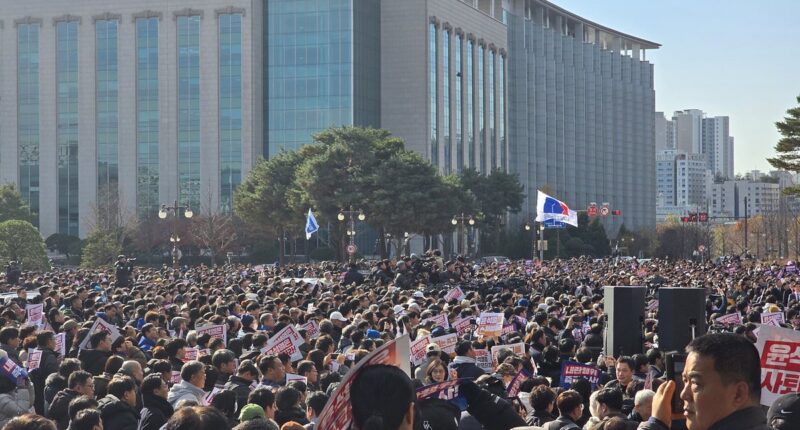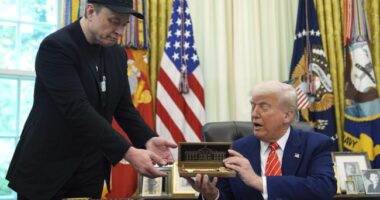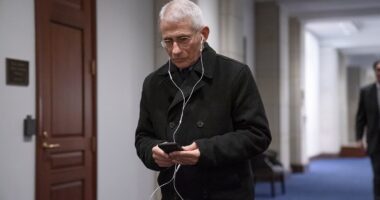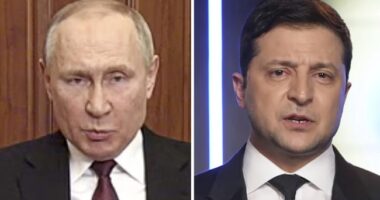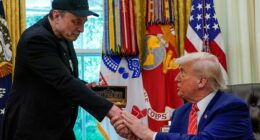South Korea’s President Yoon Suk Yeol is now facing impeachment less than 24 hours after his shock declaration of martial law plunged the country into chaos.
Opposition lawmakers, journalists and political experts are now questioning their leader’s sanity and labelled his sensational stunt nothing more than ‘political suicide’.
The scandal-hit political leader declared the extraordinary measure on Tuesday night in a bid to thwart ‘pro-North Korean, anti-state forces’ – but the move was widely seen as a political ploy to exercise greater power.
Soldiers stormed Seoul’s National Assembly as armed police and riot cops were deployed to hold off hordes of enraged protesters trying to storm the parliament buildings.
But just hours later Yoon was forced to back down following a dramatic standoff with his horrified parliament, who unanimously rejected his attempt to ban political activity and censor the media.
Now, South Korea’s opposition parties, whose lawmakers jumped fences and tussled with security forces to vote down the law, have already filed a motion to impeach Yoon with a vote expected as early as Friday.
Opposition leader Lee Jae-myung warned that the ruling party ‘will try (martial law) again when the situation is organised and improved’, while MP Joon Hyung Kim told the BBC that Yoon’s ‘impulsive’ decision showed ‘maybe he’s not in his right mind’.
Yoon, whose approval ratings were already poor following a string of scandals including corruption and influence-peddling allegations against his wife, was also ruthlessly criticised by South Korean journalists and political experts.
‘The reckless, unpopular president has effectively committed political suicide,’ said Kang Won-taek, a political science professor at Seoul National University.
Yeom Joo-young, a veteran journalist, told This Week in Asia: ‘By staking his political future on this reckless gamble, he has failed miserably… Ironically, this crisis could serve as a turning point to end the prolonged political instability of Yoon’s presidency and pave the way for a restoration of order earlier than expected.’

People, gathered in front of the National Assembly Building, protest following the declaration of martial law in Seoul, South Korea on December 04

Protesters from conservative groups attend a rally supporting South Korean President Yoon Suk Yeol and denouncing opposition party’s politicians after the President’s surprise declaration of the martial law last nigh

South Korea’s main opposition Democratic Party (DP) leader Lee Jae-myung speaks during a rally against the country’s president at the National Assembly on December 04, 2024 in Seoul

South Korean President Yoon Suk Yeol said on Wednesday he would lift a martial law declaration he had imposed just hours before
‘We’ve submitted an impeachment motion prepared urgently,’ representatives for six opposition parties including the main Democratic Party said at a live press briefing early this morning.
They added that they would discuss when to put it to a vote, but it could come as soon as Friday.
The opposition holds a large majority in the 300-member parliament and needs only a handful of defections from the president’s party to secure the two-thirds majority needed to pass the motion.
Even the leader of Yoon’s own ruling party described the attempt as ‘tragic’ while calling for those involved to be held accountable.
Han Dong-hoon called Yoon’s decision wrong and vowed to ‘stop it with the people.’
Earlier the Democratic Party said it would also file charges of ‘insurrection’ against Yoon, his defence and interior ministers and ‘key military and police figures involved, such as the martial law commander and the police chief’.
The president’s shocking late-night address triggered chaos on the streets yesterday in Seoul where hordes of angry citizens clashed with riot cops and security forces outside the National Assembly.
South Korea’s military proclaimed that under martial law, parliament and other political gatherings that could cause ‘social confusion’ would be suspended and anyone found to violate the regulations could be arrested without a warrant.
Yoon vowed ‘to protect the free Republic of Korea from the threat of North Korean communist forces, to eradicate the despicable pro-North Korean anti-state forces plundering the happiness of our people and to protect the constitutional order.’
‘With no regard for the livelihoods of the people, the opposition party has paralysed governance solely for the sake of impeachments, special investigations, and shielding their leader from justice… Through this martial law, I will rebuild and protect the free Republic of Korea, which is falling into the depths of national ruin,’ he said in his address.
But the speech sparked an immediate outpouring of anger as disgruntled citizens marched on the capital’s parliament building.
During the tense and shocking hours under martial law, heavily armed special operations forces surrounded the parliament, backed by army helicopters and armoured vehicles.
Lawmakers climbed walls to get into the building and held off troops by activating fire extinguishers.
Politician and former news anchor Ahn Gwi-ryeong tried to pull away an assault rifle a soldier had pointed at her chest as she shouted: ‘Aren’t you ashamed of yourselves?’
The lawmakers who managed to reenter the building rejected Yoon’s martial law declaration 190-0, including 18 lawmakers from Yoon’s party, forcing Yoon to rescind it at a hastily assembled Cabinet meeting.

Lawmakers and members of the South Korea’s main opposition Democratic Party (DP) demonstrate against the country’s president at the National Assembly on December 04, 2024

Soldiers try to enter the National Assembly building in Seoul on December 4 2024, after South Korea President Yoon Suk Yeol declared martial law

Soldiers advance to the main building of the National Assembly after South Korean President Yoon Suk Yeol declared martial law in Seoul, South Korea, December 3, 2024

Soldiers try to enter the National Assembly building in Seoul on December 4 2024, after South Korea President Yoon Suk Yeol declared martial law

A man confronts police officers outside the National Assembly, after South Korean President Yoon Suk Yeol declared martial law, in Seoul
Yoon’s U-turn in the early hours of Wednesday morning following the unanimous ruling against his martial law prompted jubilation among flag-waving protesters outside parliament who had braved freezing temperatures to keep vigil through the night in defiance of Yoon’s martial law order.
Demonstrator Lim Myeong-pan, 55, declared that Yoon now has to go.
‘Yoon’s act of imposing it in the first place without legitimate cause is a serious crime in itself,’ Lim told an AFP reporter in Seoul.
‘He has paved his own path to impeachment with this.’
With more protests expected through Wednesday, large numbers of police were patrolling key avenues Wednesday afternoon.
‘I was so incensed I couldn’t sleep a wink last night, I came out to make sure we push out Yoon once and for all,’ 50-year-old Kim Min-ho said at a fresh demonstration at the assembly Wednesday.
South Korea’s largest union coalition, the Korean Confederation of Trade Unions, is also planning to hold a rally in Seoul on Wednesday and called an ‘indefinite general strike’ until Yoon resigns.
If Yoon resigned or was removed from office, Prime Minister Han Duck-soo would fill in as leader until a new election was held within 60 days.
‘South Korea as a nation dodged a bullet, but President Yoon may have shot himself in the foot,’ Danny Russel, vice president of the Asia Society Policy Institute think tank in the United States, said of the first martial law declaration in South Korea since 1980.

South Korean soldiers try get into the national assembly on December 04, 2024 in Seoul, South Korea

Police officers block protesters outside the National Assembly after South Korean President Yoon Suk Yeol declared martial law
Yoon scraped into the presidency in a close run election in 2022, winning by a margin of less than one per cent over opposition leader Lee.
But Yoon’s People Power Party suffered a landslide defeat at a parliamentary election in April this year, ceding control of the unicameral assembly to opposition parties that captured nearly two-thirds of the seats.
Yoon’s popularity has tanked in particular due to his dismissal of calls for independent investigations into scandals involving his wife and top officials – drawing quick, strong rebukes from his political rivals.
The President has repeatedly vetoed bills passed by the Democratic Party to appoint a special prosecutor to investigate alleged wrongdoings by his wife, including allegations of stock price manipulation before Yoon’s election.
The opposition has also sought to impeach cabinet members, including the government’s auditing chief, for failing to investigate the First Lady amid allegations of corruption and influence peddling.
Yoon’s declaration of martial law comes one day after the opposition Democratic Party – which has a majority in parliament – put forward a motion to impeach some of South Korea’s top prosecutors amid criminal investigations into their leader Lee.
The opposition sees the investigations as a political campaign against Lee who has been seen as the favourite for the next presidential election in 2027 in opinion polls.
Opposition MPs last week also slashed budgets that the government and ruling party had put forward for 2025.

People, gathered in front of the National Assembly Building, protest following the declaration of martial law in Seoul, South Korea on December 04, 2024

Furniture lies piled up in a room after military forces broke into the National Assembly building after South Korean President Yoon Suk Yeol declared martial law, which was reversed hours later, in Seoul, South Korea, December 4, 2024

A person’s eyewear reflects people and lawmakers attending a rally to condemn South Korean President’s surprise declaration of martial law last night and to call for his resignation, at the national assembly in Seoul, South Korea, December 4, 2024
In the wake of the martial law announcement and the subsequent U-turn, the United States’ ambassador to South Korea told the Yonhap news agency that Washington is ‘encouraged by the resilience of Korean democracy’.
‘We were concerned about the events of last night… The United States supports that democracy and the people of Korea to resolve issues peacefully, democratically and constitutionally,’ Philip Goldberg said.
US Secretary of State Antony Blinken said he welcomed Yoon’s decision to rescind the martial law declaration.
‘We continue to expect political disagreements to be resolved peacefully and in accordance with the rule of law,’ Blinken said in a statement.
South Korea hosts around 28,500 American troops as a legacy of the 1950-1953 Korean War.
Planned defence talks and a joint military exercise between the two allies were postponed amid the broader diplomatic fallout from the overnight turmoil.
Sweden’s prime minister postponed a visit to South Korea, a spokesperson said, and Japan’s lawmaker group on Korean affairs cancelled a trip to Seoul slated for mid-December.
